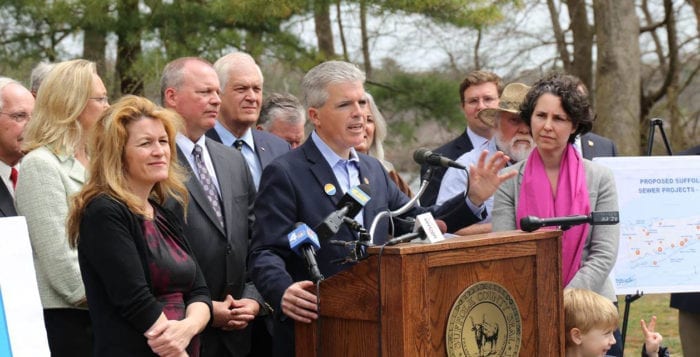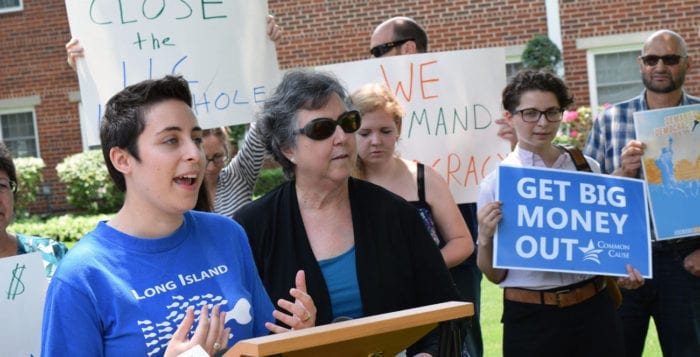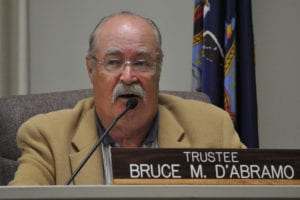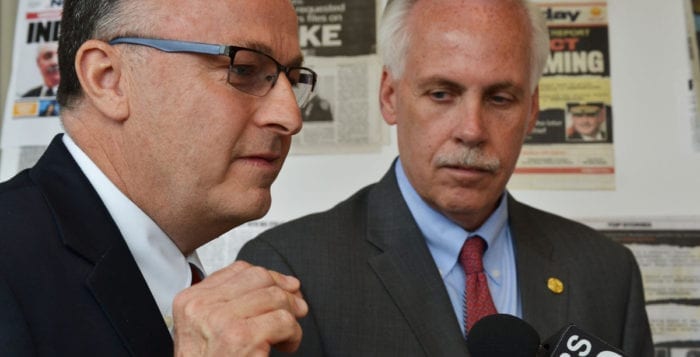Suffolk County is delaying a bold proposal that would have charged residents a minimal fee to enhance water quality protection efforts.
In April, Suffolk County Executive Steve Bellone (D) staged a press conference in the company of environmentalists and lawmakers to announce his plan to address nitrogen pollution in drinking and surface water across the region by charging an additional $1 per 1,000 gallons of water. It needed the state legislature’s blessing in order to go before Suffolk County residents in a referendum vote in November, and this month, Deputy County Executive Jon Schneider said in reports that the county would be holding off on the plan to allow more time before putting it on the ballot.
The proposal would have kicked in in 2018 and established what Bellone called a “water quality protection fee,” which would fund the conversion of homes from outdated septic systems to active treatment systems, the county executive said. He estimated the $1 surcharge would have generated roughly $75 million in revenue each year to be solely dedicated to reducing nitrogen pollution — and still keep Suffolk County’s water rates nearly 40 percent lower than the national average.
Peter Scully, deputy county executive and head of the water quality initiative, said in an interview that some state lawmakers showed no interest in advancing the proposal, forcing the county’s hand before putting it to a referendum.
He said that Bellone preferred this kind of surcharge be decided by residents via referendum.
“We received kind of a sobering indication from the state Senate that there was not enough support for the proposal to let the people of Suffolk County vote,” he said. “We decided that this appears to be more of a timing issue.”
Richard Amper, executive director of the Long Island Pine Barrens Society, endorsed the initial county proposal but said he was “mad as hell” over the decision to halt the plan for another year. In an interview with TBR News Media, Amper said the administration was handcuffed by state lawmakers who did not want to see Bellone’s plan come to fruition.
“If I had children, and they pulled something like this, I’d send them to their room,” Amper said. “The Bellone administration felt the Senate had made this decision for them. It was killed — not withdrawn.”
Amper said state Sen. John Flanagan (R-East Northport) expressed little interest in allowing Bellone’s proposal to come to a vote this November and accused him of playing political games with the environment.
“This is something they can’t not do something about,” Amper said. “It’s the biggest environmental and economic crisis this island ever faced.”
A spokesman for Flanagan issued the following statement: “Our office has always considered the merits of any legislative proposal advanced by Suffolk County’s elected officials, and we will continue to do so in the future.”
State Assemblyman Steve Englebright (D-Setauket) — a known environmental activist — said the measure would have done wonders for the state’s water supply.
“We’re really looking at an opportunity to correct some deficiencies that could, if left uncorrected, unhinge our economy, which is based upon people bathing and recreating in our coastal waters, fishing and otherwise enjoying our waters,” he said when it was announced. “For the first time, we are pulling a program together that integrates both our fresh water and saltwater in one protection initiative, and that is very significant.”
Some lawmakers, including county legislators Rob Trotta (R-Fort Salonga) and Leslie Kennedy (R-Nesconset) staged a press conference following Bellone’s proposal to express opposition, calling it unwelcomed taxation.
George Hoffman, of the Setauket Harbor Task Force, also stood behind Bellone’s proposal when it was announced and said it would benefit Suffolk County for decades to come. He said it was “one of the most far-reaching and important public policy issues in decades,” and said it was important to proceed slowly and “get it right” moving forward.
“I worked with the supervisor of Brookhaven in 2003 when the town put forward a $100 million dollar open space fund referendum that received over 70 percent voter approval — but we spent many months going out to the various communities and explaining why it was needed,” he said. “You can’t cut corners on big policy issues and when you need the voters to approve new funding sources like the proposed water surcharge.”
Roughly 90 percent of the population in Nassau County operates under an active wastewater treatment system through connections to sewage plants. But in Suffolk County, there are more than 360,000 individual cesspools and septic systems — representing more unsewered homes than in the entire state of New Jersey — that are more likely to release nitrogen into the ground and surface water.
Scully said the county would be workshopping the proposal with civics and business and other stakeholders across Suffolk in order to perfect the proposition before putting it to a vote.
“If there are folks who are opposed to our proposal and don’t have one of their own, that means they’re not concerned about solving the problem,” he said. “We’re hoping we can get productive discussions.”





















